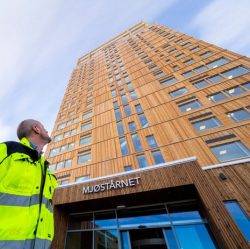To provide the best experiences, we use technologies like cookies to store and/or access device information. Consenting to these technologies will allow us to process data such as browsing behaviour or unique IDs on this site. Not consenting or withdrawing consent, may adversely affect certain features and functions.
The technical storage or access is strictly necessary for the legitimate purpose of enabling the use of a specific service explicitly requested by the subscriber or user, or for the sole purpose of carrying out the transmission of a communication over an electronic communications network.
The technical storage or access is necessary for the legitimate purpose of storing preferences that are not requested by the subscriber or user.
The technical storage or access that is used exclusively for statistical purposes.
The technical storage or access that is used exclusively for anonymous statistical purposes. Without a subpoena, voluntary compliance on the part of your Internet Service Provider, or additional records from a third party, information stored or retrieved for this purpose alone cannot usually be used to identify you.
The technical storage or access is required to create user profiles to send advertising, or to track the user on a website or across several websites for similar marketing purposes.
 Policies aimed at encouraging rural innovation should take into account the differences between entrepreneurs and how they view where they live, according to a new study. Researchers at the University of East Anglia (UEA) and De Montfort University have found that meanings attached to where someone lives are shaped by previous experiences, and this in turn influences their innovation strategies and entrepreneurial activity. (more…)
Policies aimed at encouraging rural innovation should take into account the differences between entrepreneurs and how they view where they live, according to a new study. Researchers at the University of East Anglia (UEA) and De Montfort University have found that meanings attached to where someone lives are shaped by previous experiences, and this in turn influences their innovation strategies and entrepreneurial activity. (more…)








 HP has published a new study underscoring the importance of sustainable business practices in recruiting, hiring and retaining top talent. It suggests that employees are more productive, motivated and engaged when working for an employer who is leading the charge in social responsibility. The global, 20,000-participant
HP has published a new study underscoring the importance of sustainable business practices in recruiting, hiring and retaining top talent. It suggests that employees are more productive, motivated and engaged when working for an employer who is leading the charge in social responsibility. The global, 20,000-participant 




 UK-based
UK-based 
 New guidance has been launched by the UK Green Building Council (UKGBC) to assist client organisations to include more ambitious circular design and construction best practices in project briefs for non-domestic projects. It addresses the commercial realities associated with making this practically happen and provides support and evidence to assist clients in setting clear strategies that ensure budget, project timescales and risks are all minimised and mitigated. The guidance may also be helpful for those in the supply chain looking to support construction clients on their journey towards specifying and practically applying circular economy principles.
New guidance has been launched by the UK Green Building Council (UKGBC) to assist client organisations to include more ambitious circular design and construction best practices in project briefs for non-domestic projects. It addresses the commercial realities associated with making this practically happen and provides support and evidence to assist clients in setting clear strategies that ensure budget, project timescales and risks are all minimised and mitigated. The guidance may also be helpful for those in the supply chain looking to support construction clients on their journey towards specifying and practically applying circular economy principles.

















